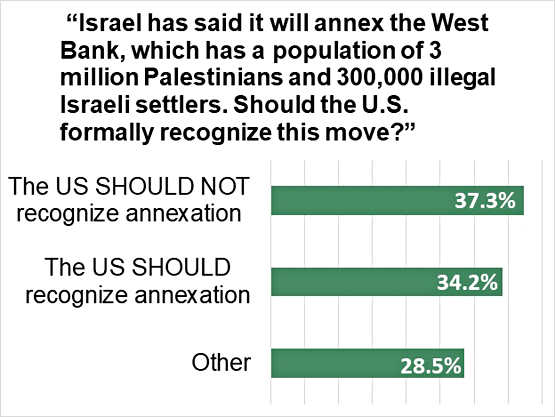Public opinion polls soliciting the views of American voting age adults on timely policy matters impacting Israel and its US lobby are scarce. Americans are only rarely asked about whether they approve of the U.S. having given the lion’s share of the foreign aid budget to Israel over the last seven decades. Perhaps that is because they do not approve. Few Americans have been polled on whether they would personally accept the economic incentives of the Trump Middle East “Deal of the Century.” In fact, they would not. They have also nearly never been asked about whether they support campus bans on free speech rights to boycott Israel over its human rights record. It turns out Americans like free speech rights.
Instead, what should be a vibrant and expansive polling ecosystem, is instead a void periodically filled with data and assertions that seem to paint a picture of broad, widespread support for institutionalized US policies favoring Israel. Some of the polls are so deeply flawed and misleading they must now carry warning labels. Gallup’s annual poll asking Americans whether they sympathize more with Israelis or more with Palestinians is one case in point.
In 2019 Gallup finally admitted that its sympathy question had deep systemic flaws that tended to trigger higher response rates for Israel over Palestine. But the poll question – and decades of data – have been used by the Israel lobby to assert that most Americans back Israel. The Congressional Research Service also used the poll as a proxy for claiming Americans support US aid to Israel. And, whenever it is released – usually right before AIPAC’s annual policy conference in Washington – Gallup’s poll is immediately regurgitated across the spectrum of pro-Israel scribes.
Gallup was late in releasing its flawed poll results in 2020. The moment it did, the Begin-Sadat Center for Strategic Studies used it to claim that,
Data and analysis of surveys of American public…reveal that from 2000 to 2020, Americans have consistently viewed Israel favorably and the Palestinian Authority unfavorably and shown much more sympathy for Israelis than for Palestinians.
IRmep debunked Gallup’s “sympathy” poll question results in 2018 and 2019. The majority of Americans consistently have “no opinion” on which group merits more “sympathy.” But rather than ditch the question or formulate a strategy to adjust polling to yield accurate results, in 2020 Gallup is taking care of the inaccuracy problem with a footnote:
“Gallup’s Mideast sympathies trend documents important changes in Americans’ reactions toward the Palestinian-Israeli dispute; however, the precise percentage sympathizing more with Israel can vary, depending on survey context. Recent Gallup research found that the standard question order used on Gallup’s annual World Affairs Survey, where this question follows the favorable ratings of countries, produces a higher percentage of Americans – 11 percentage points higher in 2019 – sympathizing with Israel than when the question is asked on surveys where it does not follow the favorability question.”
So, Gallup is still delivering flawed product – much the way it did nearly a decade ago to government clients resulting in heavy False Claims Act fines – only now with an open admission that the polling product is flawed.
However, the question Gallup, or more accurately uncompromised American pollsters, should now be asking is whether Americans support their government recognizing an impending Israeli annexation of some or all of the Palestinian West Bank. Such an annexation and simultaneous US recognition could have enormous negative consequences for Americans, triggering future war, instability, and mass casualties. They even might make grassroots moves to oppose it, if asked or given more information.
Israeli Prime Minister Benjamin Netanyahu campaigned on a promise to annex portions of the Israeli-occupied West Bank. Annexation is even included in the unity agreement between the Likud and Blue and White parties in their governing coalition. Netanyahu is battling serious corruption charges – related to his old nuclear trigger smuggling ring associate Arnon Milchan – and due to hand over power to his unity government partner Benny Gantz in October of 2021. Netanyahu plans to bring up the annexation initiative in parliament this summer. The Trump administration, which rubber stamped Israel land grabs in Jerusalem and Syria after taking office, has continuously signaled that it will support West Bank annexation.
Of course, most of the rest of the world views Israel’s longstanding occupation of Palestinian lands and imminent annexation plans as violations of international law and Palestinian human rights. A plurality of Americans, now that they have finally bee asked in a representative poll, also oppose it.
When asked, 37.3 percent responded that the US should not recognize Israeli annexation, while 34.2 percent said that it should. Other responses offered by the remaining 28.5 percent revealed many saying they had insufficient information to state an opinion.
That expressed lack of information should be no surprise. On this, as in other key questions of US Middle East foreign policy such as the 2003 US invasion of Iraq, or Iran nuclear deal, Americans are being deluged in waves of disinformation and obfuscation. As the Trump administration and Israeli government operatives plot behind the scenes, shutting out the public and pretending they back all things Israel could once again have extremely negative consequences for Americans and the rest of the world.
Grant F. Smith is the director of theInstitute for Research: Middle Eastern Policy in Washington which is co-organizer of the 2021 Transcending the Israel Lobby at Home and Abroad conference at the National Press Club.

